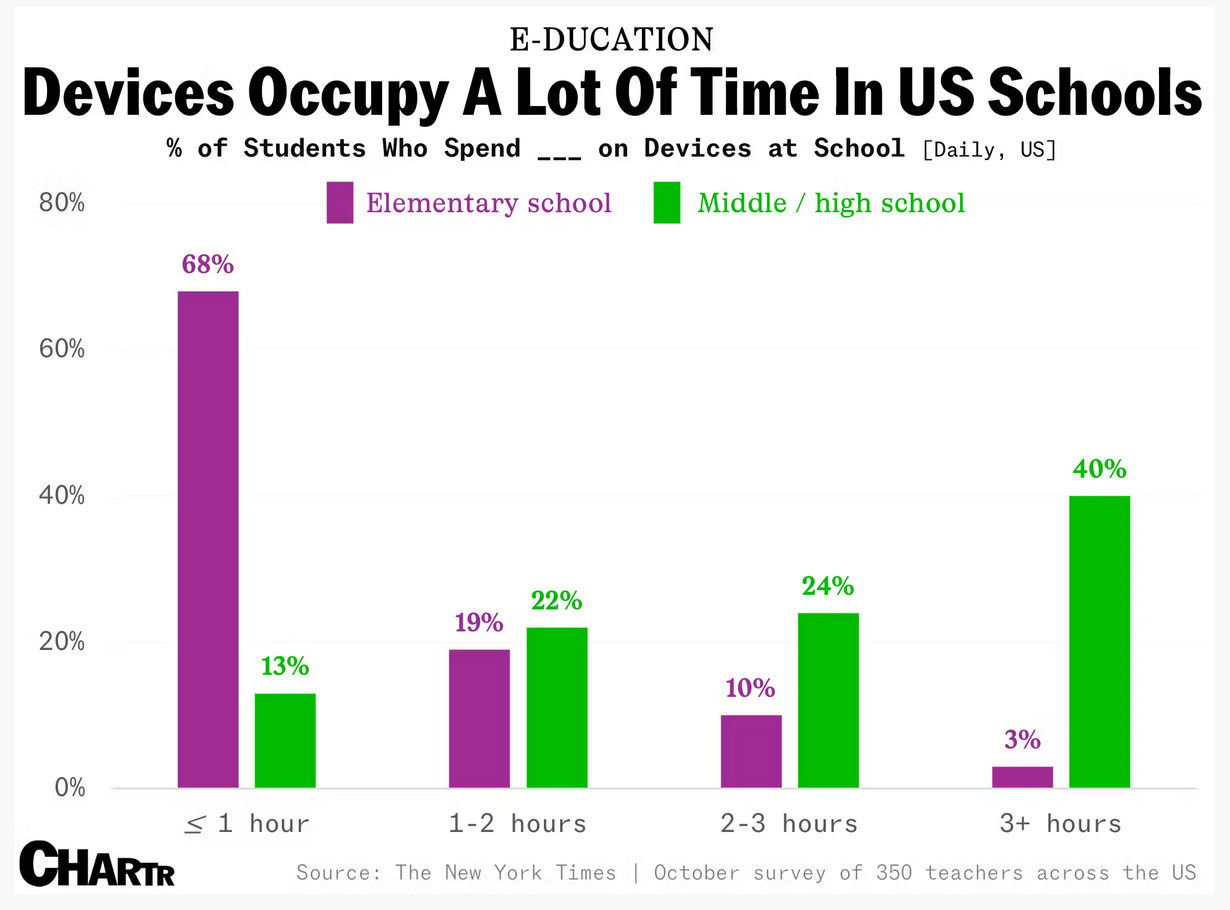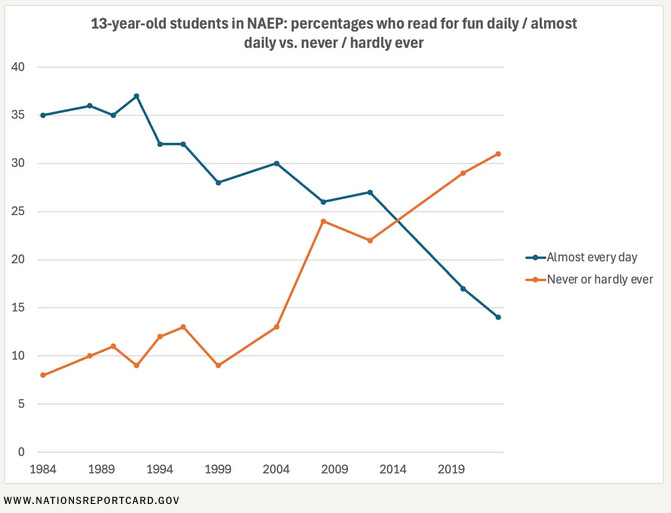6 Things on education & technology | 23 Nov 25
People and publications on both sides of the political aisle are acknowledging the impact of policies and phones (and other digital devices) on kids.
1. The Big Fail | Student achievement has fallen off a cliff. And neither Trump nor the pandemic is to blame. (NY Mag)
American education is in a deep, long-running crisis that many parents—especially in affluent districts—have failed to recognize. National Assessment of Educational Progress scores show steep drops in reading and math for 4th, 8th, and 12th graders, with huge shares unable to handle basic comprehension or middle-school arithmetic; the declines began before COVID and were accelerated by it, producing a “fanning” effect where top students hold steady but low performers fall far behind, widening racial and economic gaps.
Devices replaced books and paper learning, tutoring became a private, unequal substitute, and grading softened as accountability systems weakened after 2015 and during the pandemic. Some southern states (notably Mississippi) improved through back-to-basics instruction and maintaining test-based accountability, while liberal communities often resist test data on equity grounds. Politics, complacency, and misaligned priorities have let standards and achievement erode nationwide, and even wealthy districts are discovering too late that spending and good intentions don’t guarantee real learning.
2. 40% of middle and high school students spend about half the school day on devices (Sherwood)
Nearly six years after schools shifted to remote learning, student devices have become a permanent fixture in American classrooms. According to an October New York Times survey, 8 in 10 teachers say their students now have school-issued devices—up sharply from about one-third in 2019. While younger children tend to use screens for less than an hour a day, device use increases significantly in middle and high school. Pew data show that about 40% of older students spend more than three hours per school day on devices—meaning at least half their class time is screen-based. Teachers worry about the consequences: 70% say devices distract students from schoolwork at least somewhat.
3. ‘A Recipe for Idiocracy’ (The Atlantic)
America is facing a steep and worsening decline in math skills, and the impact is now hitting universities. UC San Diego—an elite institution that once saw only about 30 freshmen arrive with below–high school–level math—now reports more than 900 incoming students who struggle with middle-school concepts such as fractions, slopes, and basic algebra. Other UC campuses, along with universities like George Mason, report similar surges in underprepared students, many of whom earned straight A’s in their high-school math classes.
National data confirm the trend: U.S. math performance has been falling for a decade, with sharp drops during pandemic-era remote learning. Eighth-grade math skills are now a full year behind 2013 levels, and the lowest-performing students have fallen even further. While top students have recovered, the majority have not.
Experts point to several causes:
Smartphones, social media, and AI have eroded attention and reduced engagement.
Schools lowered standards, adopted “no zeros” grading, and relaxed expectations during the pandemic.
Curriculum shifts emphasized engagement over evidence-based instruction.
Equity policies and limited resources often kept students out of advanced math.
The UC system eliminated SAT/ACT requirements, removing the most reliable measure of math readiness.
These policies produced a disconnect: grades inflated while actual skills deteriorated. Many top-tier students now place into remedial courses covering elementary and middle-school material.
UC San Diego’s new report urges reinstating standardized testing and rebalancing admissions to avoid enrolling large numbers of “profoundly underprepared” students who are likely to struggle. But scholars warn that fixing college admissions will not solve a nationwide collapse in numeracy.
Experts unanimously reject the notion that AI can replace foundational math skills. As one Stanford professor put it: relying on AI rather than basic reasoning is “a recipe for idiocracy.” The U.S. now faces long-term educational and economic consequences unless it dramatically restores rigor and rebuilds quantitative literacy.
NOTE: For those of you who don’t know, the movie Idiocracy is an R-rated, NSFW prophetic warning about what our society could look like when we sacrifice intellectualism (and families) for personal pleasure and consumerism. For a kid-friendly version of this prophecy, I recommend watching WALL-E.
4. Growing up Online Nearly Killed Me (After Babel)
Sexual extortion (“sextortion”) is one of the fastest-growing online dangers for young people, with Snapchat alone receiving about 10,000 reports per month — far more than the public realizes. The article tells the story of Roxy Longworth, a London teenager who was groomed, coerced, and blackmailed beginning at age 13. Older boys pressured her for explicit photos, threatened her, and ultimately circulated her images across their school. The shame and harassment that followed led Roxy into a severe mental health crisis, including self-harm, psychosis, and multiple suicide attempts.
Her mother, Gay, recounts how institutions failed them — the school blamed Roxy instead of recognizing sextortion, and the family endured a social-services investigation rather than coordinated support. Police eventually intervened, recognizing that Roxy was a victim, not a culprit. Recovery took years and required psychiatric treatment, constant supervision, and a painstaking rebuilding of trust between mother and daughter.
Roxy and Gay ultimately wrote When You Lose It, a joint memoir created through letters, to process the trauma and help others. Their experience shows how ordinary digital interactions can escalate into life-threatening harm and how shame isolates victims. Roxy later founded Behind Our Screens, an advocacy campaign pushing for safer online environments, better education, and stronger protections from tech companies.
It’s a good read that highlights both the scale of the sextortion crisis and the critical role that open conversation, parental support, and systemic change must play in preventing similar tragedies.
5. Reading Books Made a Man Out of Me (FP)
Shilo Brooks argues that true masculinity includes cultivating the life of the mind, a lesson learned not through lectures but through watching a stepfather read faithfully each night. Growing up amid instability and poor role models, he found books to be a path toward depth, purpose, and eventually an academic life he never seemed destined for. A single novel—This Side of Paradise—ignited in him a desire for an old-fashioned, rigorous education built around great books.
He connects this personal transformation to a broader crisis among young men today, noting sharp declines in reading, rising loneliness, and a widespread sense of purposelessness. Books, he argues, can save men by offering meaning, empathy, intellectual struggle, and the chance to discover their own values. Difficult books are especially important, because wrestling with them strengthens the mind. In contrast, a frictionless digital life erodes attention and humanity. Having been lifted by literature from hardship to a career in teaching and leadership, he now wants to help other men reclaim reading through a new podcast—Old School—designed to build community, spark serious conversations, and develop better men by making them better readers.
NOTE: Here’s one particular Old School podcast where Brooks interviews retired Navy Admiral James Stavridis about one of his favorite books, The Old Man and the Sea, by Ernest Hemingway. Admiral Stavridis has a personal collection of 5,000 books! …and reads around 100 books a year.
6. Niall Ferguson: Without Books We Will Be Barbarians (FP)
Ray Bradbury’s Fahrenheit 451 was prophetic about a society abandoning books, but Bradbury assumed this would require totalitarian coercion. Instead, Ferguson says, modern consumer culture has accomplished the same outcome voluntarily: people are turning away from reading on their own, absorbed by screens, distracted by entertainment, and increasingly reliant on audio, video, and emojis in place of written text. Data shows a steep, decades-long decline in reading among Americans—especially young people—as well as falling literacy skills. This shift matters because literacy is foundational to civilization: written language made possible complex commerce, law, religion, shared cultural stories, historical memory, and analytical reasoning.
Literacy also underpins skepticism, critical thinking, and the ability to distinguish myth from history. As society moves toward post-text communication and AI-driven audio/visual information, we risk reverting to a preliterate mindset—one characterized by forgetting the past, blurring truth with myth, and becoming susceptible to conspiracy theories. Ferguson warns that without reading, people lose access to the cultural inheritance that teaches virtue, lose the tools for reasoning, and drift toward a more primitive social order. If this trend continues, only a small minority of “scribes” may preserve literacy, while many others slide back into a modern version of ancient peasantry.
NOTE: I thought this was an interesting observation from Ferguson: “encouraged by the peculiar difficulty of the iPhone keyboard, there’s the rise of the emoji, which is in reality a return to the pictograph, a primitive pre-alphabetic form of written communication.”




Regarding the topic of the article, it's so insightful how you pin point the long-running crisis in education. The data on devices replacing books is alarming. What do you think are the most practicle first steps for systemic change, especially balancing tech use with foundational skills? Excellent analysis.